Last Updated on March 22, 2020
Owning a disabled animal can be difficult at times. Every loss comes with different challenges you and your feline must face. When it comes to three-legged cats, however, these challenges depend very greatly on which leg it is they are missing. The age of the cat affects the emotional standpoint more than anything. You are reading this for one of three reasons… You are curious, you are considering adopting a three-legged cat, or your cat has recently become an amputee. Let’s look at the differences between age, front leg, and hind leg amputee cats.
Age
Depending on the age the cat had its leg removed will change how the cat initially reacts emotionally. The younger the cat, the less likely it will become depressed or show signs of depression. A kitten less than 4 months of age will have the quickest recovery mentally, emotionally, and physically. When a kitten is younger than 4 months, they are still learning all it takes to be a cat and they are young enough to not be invested in daily activity most cats enjoy, such as jumping high, scratching, and using the litter box normally. For a kitten over 4 months to 1 year in age, adapting to newer ways of doing things will be more of a challenge but rarely do they suffer emotional stress long-term. Then we have young adult cats, ages 2 to 5 years. These cats will have a hard time adjusting and will likely suffer from some kind of depression. Depending on your care and love will be the final outcome of how long they are depressed. Now for adult cats, ages 6 to 9 years, it is the same as the young adults, but with a greater chance of the cat losing interest in many things they used to enjoy. Elderly cats, 10 years and over, have the hardest time coping both mentally and physically. They spent many years knowing their body and what it does and does not do. More than half of the elderly felines who lose a leg become depressed and some do become severely depressed to the point of not eating. It is the owner’s responsibility as their feline family to help them any way they can through this process.
Front Leg Amputee
When a cat is missing either front leg, they typically get on really well with basic life. Problems that can arise are covering their messes in the litter box, scratching their front nails, and general climbing. As stated above, everything varies greatly on the age. You will need to make sure their front nails are clipped on a regular basis to keep them from snagging items in the house. You will have to watch what kind of toys you allow them to play with for that same reason. To keep them comfortable, you may have to assist them with burying their pee and poop in the litter box. This may not sound appealing to some, so the self-cleaning litter pans are always an option. As for climbing and general playing, they will adjust to getting around. They did not lose their ability to jump, run, or even attempt to climb things. You would be surprised to know, the fastest cat in my home is the three-legged one missing her front left leg. She is also great at jumping and general playing. To her, life with three legs is normal.
Back Leg Amputee
When a cat is missing either back leg, they will struggle with basic day-to-day activity and will need added assistance. Problems that can arise are using the litter box, jumping, and back pain. When a cat has a hind leg taken off, they tend to have the hardest time emotionally. A huge part of a cat’s life is running and jumping, both abilities will be hindered greatly. Though they will be able to run, the ability to jump is something they have to get used to not doing. This is where the importance of steps and reachable areas they enjoy, such as windows, are very important. Areas such as beds, sofas, and windows will have to have pet stairs by them to keep the cat from harming itself. Back issues usually come into play from the cat still attempting to jump. All of a cat’s power to jump is in the hind legs, most cats never learn how to jump with only one back leg. They often become depressed from this and hind leg amputees have the worst cases of depression.
If you are considering adopting an amputee cat…
They will likely already have a system down and you will have to learn to adjust to it. Depending on the leg that is missing, you may need to consider the furniture in your home. You will want them to be as comfortable as possible and keep the injury risk as low as possible. Don’t worry about other cats or even dogs treating a three-legged cat any differently. They aren’t as shallow as us humans! They likely won’t even notice the difference.
If your cat has recently become an amputee cat…
You have to be there for them and love them. That is the most important thing. Second to that comes adjusting through the process with them. Assisting them when they need it, and using your best judgment of their overall emotional state.
SIGNS OF DEPRESSION IN CATS
You may be worried that an amputee cat is depressed, here are some signs to look for:
- Lack of appetite
- Not drinking
- Using the litter box less or not at all
- Not cleaning themselves
- Hair loss, hair pulling
- Lack of interest in things they once loved
- No interest in playing with you
- Change in vocal behavior (no purring/meowing)
- Staying in one place for very long periods
If you are concerned about feline depression, read about the most common signs here: 6 Signs of Feline Depression so you will know what to do next.
Don’t let a person hinder your thoughts of adopting an amputee cat. I heard quite a number of nasty comments such as “Why would you want that?” as if the cat was just a non-living thing to them. Amputee cats are still cats, they just need extra love from the people around them. I would actually find it beneficial for a family with children to adopt an amputee cat. Teaching them differences on the outside don’t change what is on the inside. Four legs, three legs, even two legs… A cat is a cat all the same. Compassion, love, and understanding is what they need and something we all need a little more of in this world.
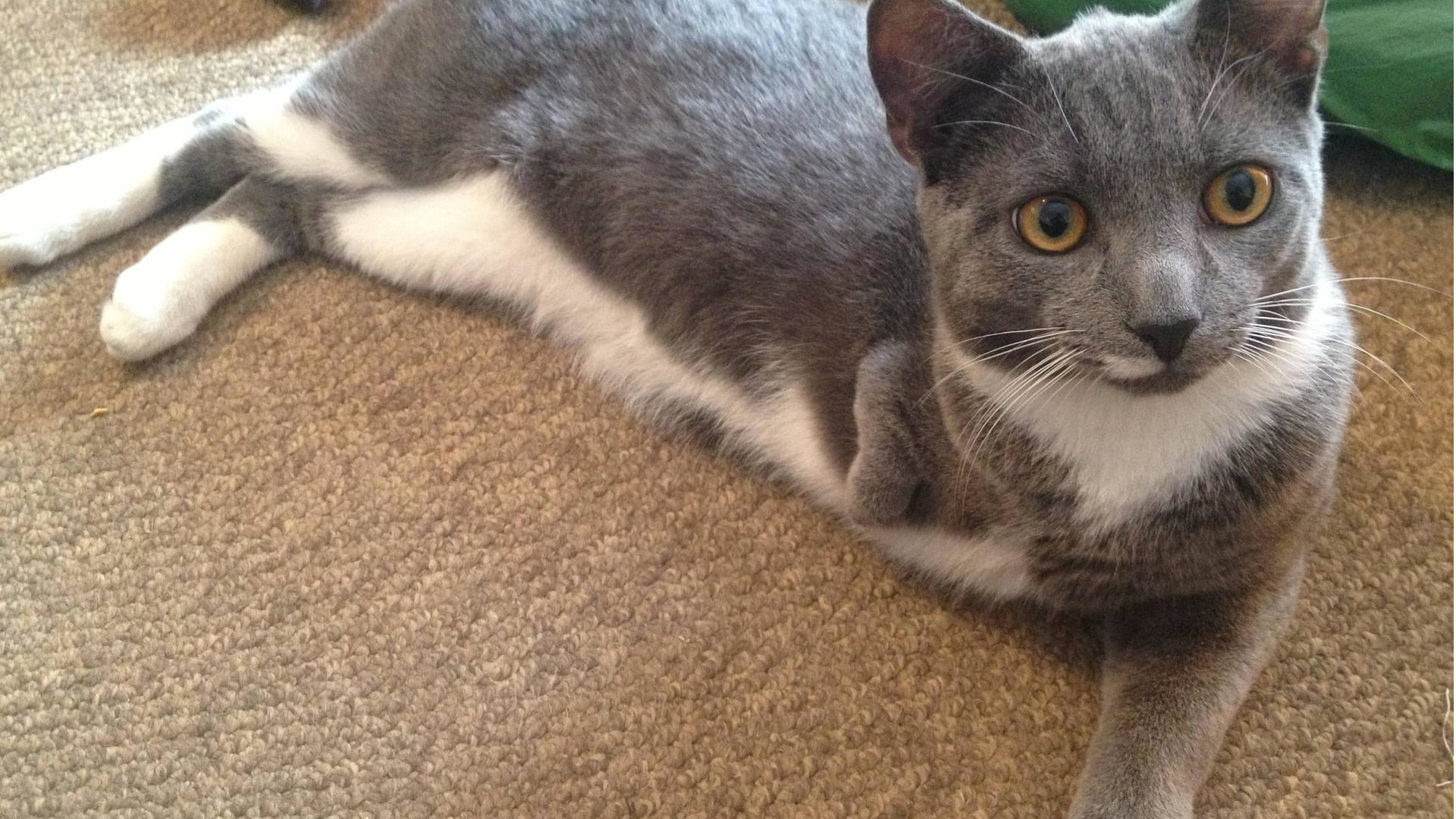
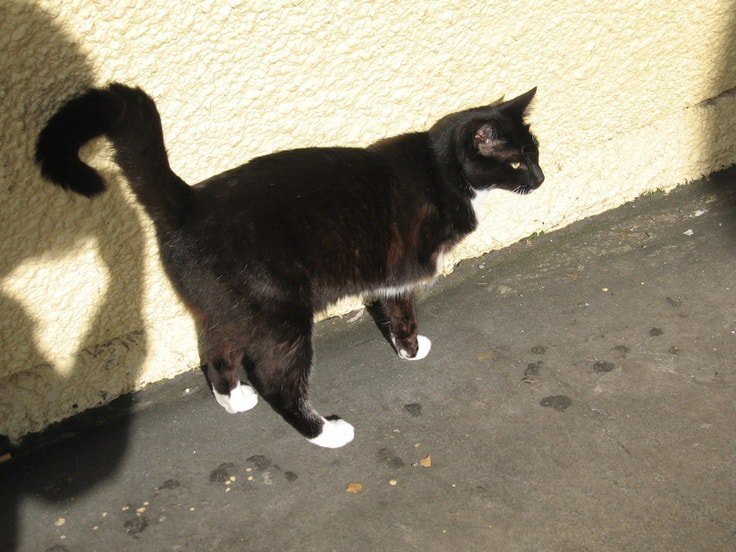

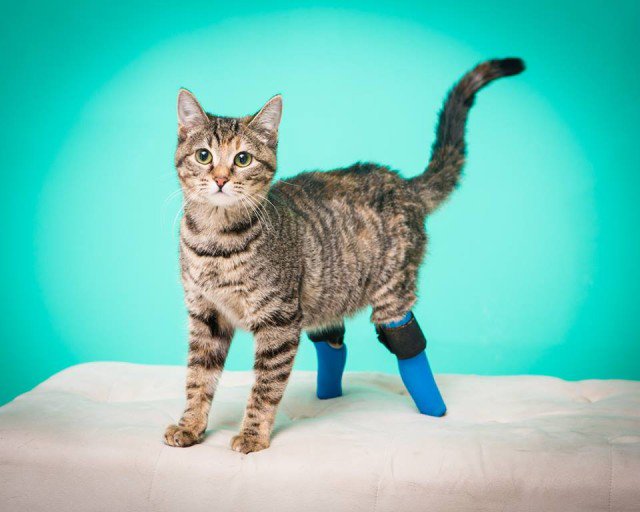
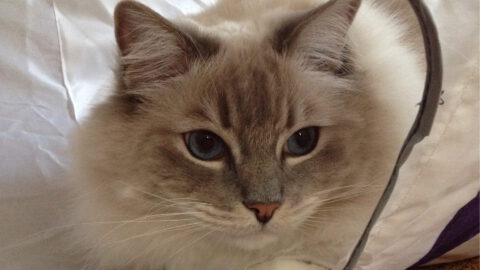
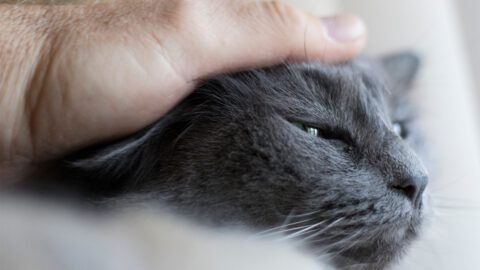
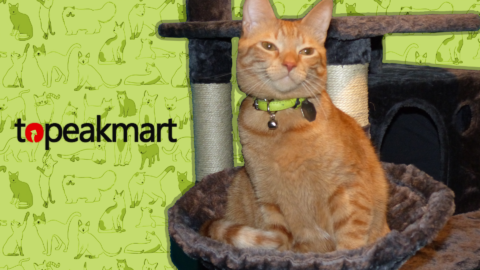

My friggin CAT took what was meant to be a chest shot, through BOTH front legs. The upper bone of one was blown to powder. She 3 legged it home, half dead, ended up losing a leg, still has shrapnel in her, & come to find out was preggo the whole time. So when I see people still posting on MGK vs. Eminem, I can’t help but think about the fact that SHE has more street cred then most rappers in the game.
I strongly disagree with your comment the cats with back leg amputees don’t know how to jump. Quite the contrary! I have two cats who each lost a back leg and both of them jump and climb very well thank you ! They appear to use their tails for leverage There is very little that a four legged cat can do the three legged cats cannot do! My cars have both adapted extremely well to losing a back leg!
I am happy to hear this as we just rescued a kitten that had been hit on the highway and we took her straight to an emergency pet hospital. Due to the accident her leg had already been severed and she is just a young kitten. Your cats give me hope that this little kitten will come home in a few days and will adjust very well to her three-legged lifestyle. I think since she is still very young she will adapt quickly to only having three legs. 🙂
I just rescued a three legged kitten. He is missing most of his hind leg, they believe something chewed it off shortly after birth. He is a very happy healthy kitty otherwise. Do you have any cat litter suggestion? The normal clumping litter is sticking to his stub on his missing leg.
Thank you.
I have a hind leg amputee myself. He’s older now and loses his balance easily in the box. Dr. Elsey’s makes a great litter for senior cats. It doesn’t stick to their fur.
Hi there, our 16 year old cat Blue was in an accident and now no longer has the use of his left leg. He has a small fracture and nerve damage, his little wrist is turned inward and he hobbles around putting some weight on it. He came home last night from the vet, we cordoned off a room and are assessing him at home prior to considering having the leg removed. It’s been devastating for all involved. Any advice or thoughts?
Thanks for your comment Karen. Growing up I had a cat with the same issue. He had enough feeling to where a pin could be put in rather than amputation. Given his age, be sure the vet does blood tests and checks him over before he goes under for surgery. The older a cat is, the greater the risk for complications with anesthesia.
My sweet 10 yr old kitty is getting her front left leg amputated due to a cancerous lump tomorrow and I am beyond stressed and saddened that she has to go through this. I already feel better, though, by reading your article and the comments here. My biggest concern is will she still be able to do her normal things like balance herself when she eats, jump up and down off the couch and bed and clean herself on the left side. I don’t have to worry about her not getting lots of love and care, but I am gone during the day and wonder if I should take her to work with me or will she be ok by herself during the day? She is the sweetest, most loving cat I have ever had and just hate this happened to her. But, I know in time, it will all work out.
Thanks for your comment Valerie. It is normal to be worried but the good news is, most cats get along just fine after facing amputation. If your place of work is a calm and comfortable space that she is familiar with, you can take her there with you for the first week but if it is a place she is not familiar with, it is best she stays at home. You don’t want to add any unwanted stress to her life after something like this.
Thank you. I was kind of thinking the same thing. It is pretty quiet but it probably is best she’s at home. I know she will do well. She is much loved.
My sweet little Mia didn’t make it. She stopped breathing a few hours after the amputation and they couldn’t get her to start up again. The vet thinks it was probably a blood clot. I’m am so heart-broken. I’ll miss her so much. She was the sweetest kitty. She just loved on me so much last night and wanted to be in my lap. I took her to bed with me and she snuggled up to me almost the whole night. Something she never did before. It was like she was saying goodbye. I am so, so sad. ?
I’m so sorry to read about the loss of your sweet kitty Mia. My thoughts and prayers are with you and your family in this difficult time.
I am very sorry for your loss. I recently lost a cat as well. It isn’t easy. Take care of yourself and focus on the good memories.
I have a tripod kitten, a friend found him in the street after a person ran over his front leg. I took her to the vet and decided to keep her. I am worried because she sleeps alot but I guess its normal in kittens and she eats well and is very clean, uses her litter box without help.
My six year old Russian blue had a hind leg amputated when he was three. I adopted him about six months after his amputation. During the time I’ve had him, he has not had problems running, jumping or getting on furniture. His personality is skittish, so he runs under the bed when frightened. As for depression, this hasn’t really been an issue. As for imperiousness, this is a continual problem and he remains hopeful that I will continue to learn to better serve him. He’s a wonderful cat.
Thanks for sharing about your lovely Russian Blue, Bruce!
I adopted a three legged cat a few days ago but he has not come out of hiding ever since I brought him home. He seems so stressed and shy. What can I do to make him feel safe and to socialize with me? Please help. Poor baby has been through so much and I want him to finally have a normal life in a loving environment.
Thanks for your comment Nass. Because this kitty is in a new environment with a new person (or people) it will take a few days (usually 2 to 5 days). He will likely want to find a safe space and hide so make sure a water dish, litter box, and food dish are close by wherever he chooses to hide. I am sure you are eager to bond with him but allow him to feel safe in his new environment first. For more information on earning his trust, please read https://purrfectlove.net/how-to-earn-a-cats-trust/
Thank you so much for your help. He is under the bed in a room where no one goes. I put everything near him but he’s not eating or drinking. Is he gonna be ok if he doesn’t eat for a couple of days? I’m just worried about him.
I also have another male cat who’s usually friendly with other guest cats that come to our house. I still haven’t let them see each other. But I was wondering if it’s better that I introduce them to each other first and let them be friends before he trusts me? Animal interaction first or human interaction? I’m asking this because he’s been hurt so much by humans before but he interacted well with another cat in his previous home.
I have a 7 years old male just lost his hone leg to cancer. Well this cat is unreal , he’s better than ever I have had him now for 3 years. Maybe he was sick all the time I had him. But now he eats like never before. Plays. I can’t believe it he iut runs my other cats He’s very happy I am kind of surprised I have 9 cats I rescued
Thanks for your comment Mike and sharing the good news about your cat. I am very happy for him 🙂
We took in our cat about 9 months ago as my brother in law could no longer care for him financially. His hind leg is amputated up to his hip joint area. We just bought a new home a few weeks ago which has all tile and wood floors. Our previous home was all carpet throughout minus bathrooms and kitchen of course. Now that we have only tile and wood floors, our amputee kitty seems to be having a really hard time getting around and sometimes his hind leg will slip on the floor. We plan to buy area rugs for the different rooms in the home, however we don’t want to install carpet and we just planned on the area rugs being in the rooms for decor wise. Any insight on assistance in the meantime or better ideas other than carpet runners through out our new home? Thank you in advance.
Thanks for your comment Jessica. This greatly depends on the cat’s personality. You can get him some booties that have grips on them and only use one for his back paw. He may or may not like this. Some cats are not bothered by these while others are. There are also adhesive grips that can be put on the padding of his paws. They are typically marketed for dogs so you would have to see if there are small enough sizes for cat paws. Again, he may not like this. For the floor, you can consider using anti-slip spray on the wood. I don’t know much about it but you can speak with someone at a home and garden store and see if they can help you out with what to get.
Thank you for the ideas. I will certainly look into each one. He is a very gentle and laid back kitty and actually helps out alot emotional wise for our son who has special needs so the bootie may help out get him around but the anti-slip stray maybe be good for both son and kitty. Thanks again
My cat is at the vet now. He was shot by a gun 6 weeks ago. They wanted to amputate and I asked them to please try a sling first. So they did and he had his x-ray today. He has to have his fromt left leg amputated. I’m so very sad for him. He’s my 6 toed cat he loves to hunt. He’s an amazing cat but other than the front left leg he’s healed fine and back to normal. I would not make him suffer but I really thought he was healing. He’s not walking on it but he uses it to cover his poop and to sway at my other cat. He’s a tough boy and I know he’s going to take this like it’s nothing. I just love him so much and I feel bad..
Thank you for listening, Heather
Thanks for sharing about your cat, Heather R Downey Barrett. It is unfortunate when faced with something like this. Based on what you said, his age, and being in good health, I am sure he will carry on just fine. Let us know how he is doing after his surgery.
My seven year old cat had his hind leg removed, he is getting around and even managing to get up on sofa, which he loves. Biggest problem is he is not really drinking but seems to be eating. He is not having bowel movements. Went back to vet and was give an antibiotic, we did that and he stopped eating. Now off meds and he is back eating but when try’s to go to bathroom he just has nothing. Any help is welcome.
Thanks for your comment Brenda. You can try a few things to help him. Adding virgin coconut oil or unsweetened cooked pumpkin (canned) to his food or as a stand-alone treat can help with his constipation. This is assuming he likes either or both. If he is willing to just to take some without having to mix it in his food, all the better.
Another thing you can do is add water to his food. He should be on a wet diet (at least 50% wet) as cats get a lot of their fluid from eating. Dry only diets eventually lead to constipation and other digestive issues. Mixing wet food with some hot water to make it like a thick soup can help increase his water intake. Some cats will drink more if the water is moving as well so you could try a pet drinking fountain as well.
Hi it is Brenda again, I wrote a few weeks ago. My poor kitty seems to be getting worse not better. He has started to drink some, now I can’t het him to eat any thing. I have tried several brands and different flavors of wet food. He does seem to pass urine more on himself then in litter. Pooping seems to be nonexistent. I can tell his weight is dropping way to much.Planning on going back to vet on Monday. They have not been much help.We put him through surgery , and watching him now is breaking our hearts.He is miserable, and we are out of things to do. I even was thinking of getting kitten formula and force feeding.He is 7 years old, and my husband is saying we might have to now put him down because we can’t watch him just waste away?
I’m sorry to hear this Brenda. I don’t think you mentioned why his leg was removed. Why was this?
If the lack of eating and passing of urine and stool is not related to an illness, he may be depressed. You mentioned him not eating after being given an antibiotic. Sometimes cats (just like humans) can have a bad reaction to these types of medicines. Many of them disrupt natural flora in the digestive tract which can only make problems worse. I am not a veterinarian so I can’t give you medical advice here but I think it is in his best interest that you get a second opinion from a different vet, preferably a more holistic one.
What you can do for the time being is focus on positive energy and love, take that and massage him. Let him guide you to where he wants to be rubbed. I know it sounds silly but this kind of touch will release oxytocin (the “love” hormone) and it can encourage him to eat.
My cat recently had his back leg amputated and he’s about 7 or 8 years old (we rescued him and they weren’t sure how old he was). He doesn’t have all the signs of depression, as he still eats, meows, purrs and walks around… But I just feel like he’s different. He was always an affectionate cat and still shows affection, but doesn’t purr as intensely as he used to and he meows differently. He’s been pulling himself up on the couch, going up and down the stairs and even jumped over a baby gate. I’m just feeling so bad for him and we’ve been trying to give him as much love and affection as we can. Plus my other cat isn’t used to this so she hisses at him when he walks by… I’m sure that makes him feel bad. Any advice? I just feel terrible. We removed his leg bc he had a cancer growing on it and the only way to save him was to remove the leg. How can I tell if he starts having back issues? Is there anything I can do to alleviate the back pain?? Thanks!
Thanks for your comment Brandyce. You had good intentions here so don’t feel bad. Most cats will act a bit differently after amputation. This can last a few days, a few weeks, or much longer. As long as he is eating, drinking, using the litter box, etc. like normal then there isn’t anything to worry about. He might just be adjusting. As for your other cat, this is an adjustment for her too. The way she is moving is likely intimidating to her but she will get used to it. Back issues and pain tend to come later in life, it is still relatively young so I don’t think you will be seeing any signs of that for at least another 4 or 5 years, if at all. If you do suspect he is having issues with pain you will have to speak to your vet on this. Without a proper diagnosis of the issue, you won’t know how to treat it.
I do recommend adding MSM to his diet. You can buy the human-grade kind at a vitamin store (or online) or you can buy the horse grade kind from a pet store. It is all the same thing (sulfur). Cats can have up to 500 milligrams per day. You’ll want to start with 100mg and work up (100mg for 3-5 days and go up to 200mg). Too much too soon can cause diarrhea and stomach upsets. What MSM will do is protect his joints and tissue to help prevent things like arthritis. It is also great for general pains too. I have taken it myself with amazing results for neck pain and knee pain. If you are going to buy a human grade brand, I recommend NOW Foods MSM. That is what I use for myself and my pets.
My cat is 9 and recently had his back leg removed, due to Cancer. He has adjusted very very well. He is still the same sweet, loving, beautiful cat. He has recovered fully. I couldn’t be happier with the outcome. It was the best decision I could have made.
Thanks for your comment Jody and sharing that with everyone. I am happy for you and your kitty.
I have a 20 year old Cat who is a front leg amputee and is not depressed at all and functioning perfectly without his leg that we decided to take off due to cancer. He is perfectly healthy otherwise which is why we made the decision. He jumps and runs and happily lives with his 3 Cat siblings. I would hate for someone with an elderly cat to read the first part of this article and not give their Cat a chance due to your misleading and not necessarily true words.
Thanks for your comment Lisa. I am not sure what you are referring to. I encourage owners to be there for their cat if they have had to have this done or will need to. Not every cat is the same and it is down to the individual owner of said cat to make their choice based on their own cat’s personality, health, and overall emotional well-being. At the age of 15, cats become geriatric and operations on any level can pose a risk, even in healthy cats. This is true from a physical health standpoint as well as an emotion/mental one. Speak with any vet and they will tell you that. I am happy things worked out for your cat but you can’t assume all cats will be fine based on your success with your cat. It is a matter of making sure whatever is decided is the best option for the cat’s overall physical and mental health and well being.
I couldn’t agree more. Every cat deserves a chance. My 3 legged cat is very active, loving and in great health. Luckily for us the cancer hadn’t spread, so removing his back leg was the best decision we could have made. He is so darn adorable now. He always was. He’s my special baby. I couldn’t imagine not doing everything I could to prolong his beautiful life.
My vet is recommending a scapulothoracic disarticulation. She has had a swollen front paw that after a lot of testing turns out to be secondary to cancer higher up the limb. She’s quite healthy, and been pretty ok throughout the month on a fairly high dose of meloxicam. Her only behavioural change is her desire to stay full time in one spot under a table except when using the litter box. But she seems otherwise happy: good appetite, purring when she’s petted, etc. I’m prepared to bite the bullet with the amputation. But – she’s 18, and I’m concerned about the possibility of putting her into a chronic depression for her last years. Any thoughts based on experience and probabilities?
Thanks for your comment Richard. It is hard to say given her age and the circumstances. She is 18 which does bring risks physically and emotionally but it can be a lot worse for her if the cancer spreads. It comes down to how you feel she will handle either outcome. You know her more than anyone and if you feel she wouldn’t handle it well, you can look into alternative treatments for the cancer and getting in touch with a holistic Vet who specializes in cancer treatment. Amputation is almost always a last ditch effort to treat something with humans or with animals. If your Vet has concerns with it spreading or the possibility of infections, it could be her best option to go through with it. While depression can happen in cats, it is not guaranteed to happen. Some cats don’t change emotionally at all. I wish I could be of more help.
Thank you for your response. I know geriatric amputations often leave depressed cats in their wake, but I haven’t found anyone who’s actually had enough experience to provide a reliable indicator as to the likelihood of that NOT occurring in a cat this old. Just another factor I’m trying to account for before putting her through the trauma.
Richard, I have a 20 year Cat and we took his front leg off about a year ago due to cancer. He was also healthy otherwise but the cancer was growing up his leg and his leg was very infected and began to rot 🙁 we would dress and clean his wound for almost a year and he was VERY depressed then, but I didn’t want to take his leg out of fear for depression, cancer spreading, etc. He came home the day after his procedure, jumped out of the carrier, rolled over to get up on his good leg and ran to his food bowl (he loves to eat). He has been amazing ever since. I am so happy we made this decision. Based on my experience, your Cat deserves a chance too.
We adopted a young cat (maybe less than 2 years old) who had been abandoned, attacked by dogs, got an infected leg, scaled a 10 foot wall with glass shards on the top, had an amputation of his back leg as it could not be saved (it had maggots), and then was attacked again by another dog, bit in the face, and nearly lost one of his eyes. He could no longer live in a house with dogs so we took him in and he’s a very happy, active kitty who has really bonded with me. He will always be an indoor cat because we live in a city/country where street dogs are common and, just in general, he’s safer. My dilemma now is should we neuter him – I hate to remove something else from him when he’s already been through so much. There’s such a minute chance he could escape and even a minuter chance he’d survive long enough to become a father cat, is there any reason to put him through another surgery? I know male cats tend to spray until their neutered but I’ve only seen him do it once and never once since. I have a pretty sensitive sense of smell so I’m certain I’d notice if he’d done it again but I don’t think so. I’m open to all opinions.
Thanks for your comment Teresa. Male cats who are still intact will do whatever it takes to mate. He will find a way out of your house. There are also risks of keeping him intact that go beyond him escaping, real health issues that can greatly shorten his life. I have been in the operating room assisting neuterings. It is a lot less stressful for males in comparison to females (spaying). It is really fast as well, healing is quick too. I think it is best to get him fixed. I understand not wanting to put him into surgery again but neutering is nothing compared to amputation. He will be just fine after. It is likely he will become more relaxed and less stressed as well which is a good thing.
I would strongly suggest you get him neutered. I hae a three year old male Cat named Bob. Had his back right leg amputated two months ago.. He never like using a litter box and always preferred to potty outside. So each morning he looks forward to going put and doing his business. He will sit at door and have a fit to go put to potty. Lol….But if weather is bad he has to use litter box.
I’m all for neutering the little fella!
With males, it’s not really a big surgery – In fact, it entails but a small incision; so small as to simply allow, or permit the space for the Testes to be REMOVED & There not require further Surgical Intervention, or procedure.
Yes! The Cat Will have to wear a Collar/Cone to prevent him from bothering with the area until it is healed.
The Vet may Prescribe some Pain Meds, along with some Anti-Inflammatory Medication & WILL Suggest Low Activity & Rest for the first few days . . .
&
Your little guy may be a little sluggish & Play it Right up to you! Lol!
However, I assure you that it IS – For the ‘Best’ that it is done & He is NEUTERED!
For I PROMISE YOU – You DON’T want him ‘Yearning’!
NVM Him ‘Marking’!
You most certainly DON’T want him getting ‘OUT’ … Getting himself into trouble, or getting HURT, or coming HOME with ‘News’ – He’s gonna be a FATHER!
Easiest thing & Simplest of Surgeries, is the ‘Neutering’ of a Feline!
Do it NOW!
Before he gets any older & Especially before, THEM Hormones start really kicking in! ? x
I hope THIS Helps!
I was so worried about getting my ‘Son-Shine’ aka Sonny-Boy FIXED!
&
It really was, the easiest I’ve experienced!
I’ve only had FEMALE Felines & Neutering a ‘Male’ -Truly was a breeze in comparison! ? x
Male cats if not nuetered will spray and it is gross.
I am a little troubled by this article. We had a semi-feral kitten in our apartment complex get caught between the slats of a wooden fence and hang there upside down for God knows how long. When we found her the next day screaming, we got her down and allowed her to go her way, not realizing that the leg was splintered. It quickly became necrotic, and she was actually trying to chew it off when we finally caught her again. A local shelter helped us afford the amputation. Still being only around 12 wks old, she grew up not knowing her limitations. She runs, jumps and plays with all the other cats, and now at five years, she has assumed the role of “Queen” in our little brood of nine other medical rescues. Up until now, I have not worried about her, but I now have a senior dog who has arthritis in her back and spine who is in constant pain all day. I’m not going to be able to control the cat’s jumping, so what do I do to try to spare her from this horribly painful future?
Thanks for your comment Michael. Some cats are very resilient and being that she is still quite young, she will slow down a bit with age. Just map out her favorite spots in your house and make sure she has access to them without needing to jump as high. You can also start supplementing sulfur (MSM) into her diet which helps with joint and connective tissue. Make sure she is on a balanced diet and gets vitamin D3 (from direct sunlight) as well. So long as she is eating for her muscles, joints, etc. it will help greatly reduce her risk of developing arthritis. She may be more prone to it and other injuries due to having 3 legs but it is completely preventable.
Advice on semi-feral hind leg amputation. I adopted feral cat about 5 years ago (he’s now about 6-7), tamed him and named him Scratches. He lives in our yard and screened in porch with a cat door. I can hold him, pet him, etc., but no one else can. He has a wound on his back foot and after exhausting all possibilities, the last resort is amputation. I trained him on using a litter box and after staying at the vet for a few days, possibly longer after the procedure, he’ll live on the screened porch in a large dog cage until he can safely be on the porch/yard. Anyone have advice or words of wisdom? Thank you!
Thanks for your comment Pam. Because he is now missing a leg, it is best he only be let out under supervision or in an outdoor enclosure. Any level of feral cat will learn to adapt and accept this, especially after being fixed. Allowing him to come and go outdoors as he pleases is too risky for his life but keeping him contained to a cage is not a way of life for a cat either. If it is possible, granting him access to your home and allowing him to come and go to the enclosed porch is ideal.
Purrfect Love, thank you for the quick response, very helpful! He’ll only be in the large dog cage until he is adjusted and the vet thinks he’s ready to venture out onto the screened in porch at first then yard. Unfortunately, due to having 2 old animals inside and a 4 month old, inviting him indoors isn’t an option right now and he doesn’t seem interested in coming in. He has a deluxe condo and a magnetic door to come and go on the screened in porch. This is one lucky feral!
Bless yr ❤ Going thru this right now. My Bob had to have back right leg amputated. He’s 2 and a half years old. Got back leg hung in a cattle trailer and was hanging by his leg. He was pretty wild when he came here. After his surgery its been an adjustment for him and me as well.But he gets around well. He doesn’t jump up on things as of yet but it’s just been 2 months now. He looks ? cause you can tell he wants to jump up on porch rails like he use to. He has started jumping back on top of my recliner where he always liked to sleep. He does look at stuff he enjoyed jumping on and Meow. So maybe months down the road he will be back up on porch rails. Just like humans love and support or a huge part of there recovery. It breaks your heart to watch tho.
Check on soft collar after amputation much better than the cone. Amazon sells them. Hope my comments are helpful.
My fiance and I adopted a 4 month old kitten that came in to the shelter with a respiratory infection 2 months prior. We adopted him the first day he was healthy and available. We brought him home on a Friday and noticed on Sat that he was not using his back left leg. After a nice trip to the emergency vet and X-rays we found out our little kitten had a broken hip. The vet said the break was old and had healed a bit but broke again. On Monday we took our little panda back to the shelter. The shelter stated that they would amputate if we still wanted to adopt him. We did and the next day they took his leg. They also found out there were two breaks. After two weeks in recovery at the shelter, we brought him home. Panda has been such a great kitty. Such a humbling experience and he loves to cuddle. Panda is great at going up and down the stairs we got for our bed. Our issue is the litter box. We purchased a low big box. We cut almost a kitty door or lip in the front so he does not have to climb in or out. The issue is when he tries to cover his poop he falls over, right into it. Then sometimes when trying to cover it, he kicks it everywhere and falls into it. Im not sure if it’s the food making his poop too loose. Or the litter box not being big enough. Or what. Any ideas would be wonderful
Thanks for your comment Melissa. How long has he been using his box with three legs? Some kittens need more time to adjust. It may help to use less litter. Put just enough to cover one side of the box. If you suspect his stool is a bit too loose, try giving him a bit of pumpkin to stiffen up his poops. You can mix this in with his food or he can eat it by itself if he enjoys it. Just get the canned pumpkin commonly used for pumpkin pies. Be sure it has no sugar or anything added to it.
Okay I have an older cat 9 years or so neighbors shot him and his front right leg was amputated about a year ago. I don’t feel like he’s depressed but he was an indoor outdoor cat and now of course he is not 🙁 my main issue is with his litter. I don’t mind covering up his potty however it gets so stuck in his paws which wasn’t ever a thing and he drags it everywhere it’s discusting. I really don’t like to sit and sleep in random cat litter and I know my boyfriend is completely grossed out and I am too honestly. Any recommendations for a cat litter?
Thanks for your comment Kristin. What kind of litter box are you using? I recommend using a jumbo size one which will give him more room to move if you are not already. Make sure it is low in the front but high in the back (sides). As far as litter goes, you want something that clumps very fast. Wheat litter is said to be a very good option for this (you can check out a great brand here: http://amzn.to/2FiOIkA) as it is lighter in weight, doesn’t stick, and should be easier for him to use. Also consider using a litter mat designed to pull anything that gets stuck on his toes off when he leaves the litter box.